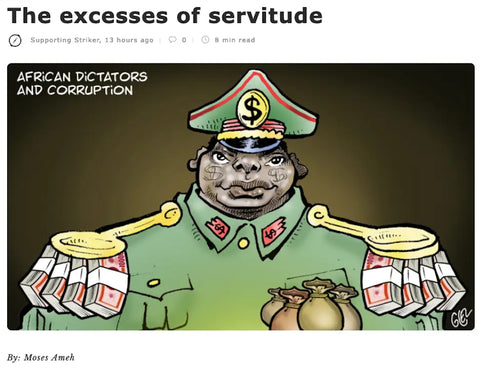Satire's Strength is Honesty
A recent undertaking to determine the value of Medium as a literary platform, more accurately to prove my belief that it has no value, I started Christian Pollution, a publication critical of Christians since they are topic-rich with issues. The publication takes an adversarial stance with Christians, pointing to their many flaws with hyperbolic, harsh language reinforced with facts to force Christian readers to the point. This use of sarcasm and vehemence worked as intended, drawing the enemy to the kill zone, but the publication felt too one-dimensional, and I added friend and author Terry Trueman, who also enjoys revealing Christian flaws. This added some humor and more perspectives, but still desiring to draw another readership, I decided to go with an alter ego, Pastor Christian T. Roll. Knowing the inability of many social media users to distinguish satire from earnest writing gave birth to his name, which I felt clearly reflected his satirical nature. If the play on the name were not enough, the bizarre doll as the character should have provided the clue to the parody.
Pastor Christian T. Roll

You heathen fudgers are all part of the lying atheist, homosexual, feminazi, communist agenda to destroy America and Christianity!
Satire's defining confounds many readers for not understanding the device. Judging from the reactions, some believe satire is bad comedy without meaning.

Others seem to consider satire useless or dishonest, albeit mostly those targeted, which raises many other questions, most notably satire's value.

The creationist, alt-right, bigoted, conspiracy theorist pastor formed somewhere between National Lampoon and Mad Magazine's inspiration. Already proving successful, the character accrued thousands of views in less than sixty days and continues growing popular. To date, the most successful article, The Truth about Alexandria Ocasio Cortez racked up nearly six thousand reads alone and continues to produce readership. The Christian Pollution performs well, owing much to Christian T. Roll and non-pseudonym satirical stories, such as The Christian Story of Creation and Dinosaurs, also attracting thousands of readers. Though too early in the publication’s life to determine Medium’s value, I admit the growth looks promising, and eating a large bowl of crow may be in my future. While waiting to see the outcome, I thought the experiment warranted a discussion of satire.
Critics of satire tend to view the writing as low-brow and unworthy of serious consideration, but this view, though held by many people, seems to lack understanding of the purpose and benefit. Some topics or issues invite satire as the only means of criticism because of their inability to be questioned due to social power dynamics. In places with authoritarian governments, satirists breach censorship with social justice concerns, such as Nigerian-based blog Punacracy, which draws attention to corruption and authoritarian issues both nationally and globally.

The Excess of Servitude by Moses Ameh

How to be an Aid to a Nigerian Big Man by Sylva Nze Ifedigbo
Here in the US, satire serves the same function and provides a necessary tool for Christian Pollution since Christians dominate the US, holding a self-perception that lacks a critical view. (That is an understatement.) The enormous Christian population doesn’t prevent but tends to ignore criticism deemed offensive, believing themselves above reproach despite forcing their offensive worldview into politics and lawmaking. How do you tell someone they are oppressive when they believe they are good Christians with all the answers, including salvation? Even more intriguing, how do you show them they suffer oppression when indoctrinated otherwise? Satire hammers these answers, forcing a realistic self-perception with sarcasm, hyperbole, farfetchedness, and irony.

From my story, The Real Housewives of Christianity
Only by pulling people outside their bubble and forcing a view of their behavior and hypocrisy's reality can dominant groups like Christians be reached. Satire has served this purpose throughout history dating back to ancient Greece, continuing through Voltaire, Swift, and Twain.

From the Story Christian Safe Zones
While rational, civil discourse seems more appropriate for reaching large groups, these forms of argument often fail, no matter how well written. They lack the emotional sharpness to pierce generations of entitlement and ignorance. When All in the Family was about to air, CBS balked, wanting to use a milder episode to ease the protagonist, Archie Bunker, onto American viewers. Producer, Norman Lear, fought this decision, wanting the audience to get the full flavor of the Bunker character. Even for 1971, the ravings of Bunker would harshly thunder as reported by Ronald Brownstein in the Atlantic,
Within minutes, Archie is raging against “your spics and your spades”; complaining about “Hebes” and “Black beauties”; calling Edith a “silly dingbat” and telling her to “stifle” herself; and describing Mike as a “dumb Polack” and “the laziest white man I’ve ever seen”.

By CBS Television - eBay item photo front photo back, Public Domain
All In The Family radically shifted television in a new meaningful light and gave Hollywood the green light for new shows that would continue challenging viewership with meaning and social issue awareness. For many Americans, Archie Bunker presented a disturbing mirror of uncomfortable flaws. Still, others saw Bunker as the persona non grata reviled for possibly becoming or associating with the undesirable.
Not all fans of All In The Family saw the satire of Bunker and internalized the message beneficially. Some saw Bunker as the hero because they saw themselves in Bunker, and that character gave them license to continue their bigotry. Such is the nature of good satire for treading a thin line of realness crossed easily by readers and viewers. These failures to reach an audience are expected.
The Christian T. Roll character produced the anticipated confusion with reality disclosed in reader comments, but the reader volume reflected satire's audience reach. Many people desire a disclaimer placed on satire for not wanting people to be confused, but doing so degrades the reading value by altering the perception of the work before reading. I rejected the disclaimer or even a tag on the story saying "satire," believing readers who grasp the satirical nature are better for it, having not been spoon-fed thought.
Perhaps the most potent element in satire is honesty. Satirists like Voltaire and Mark Twain earned remembrance for not simply writing thought-provoking stories but for revealing inequality and corruption. While good and evil often blur, most apparently in satire, they do exist. Perhaps the best satire forms in the truth that elucidates social justice issues. Archie Bunker resonated with the bigotry and racism many Americans reflected in their daily life, and that honesty drove change not just in television but in culture. Anything other than invoking an honest view forms either slander or propaganda, both of which are dishonest and exploitative.
~~~
Pastor Christian T. Roll Now Appears on this site since September 1, 2022.





